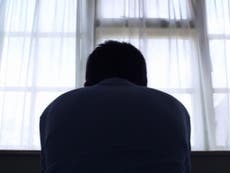Nobody prepared me for the terrifying time my mental health deteriorated – so I want others to know where to turn
When I sat in a dark room, pulling my own hair out, physically sick at my own reflection, hallucinating, forgetting how to breathe and hearing voices that were convincing me I was worthless, I didn’t know I could be helped

When I suffered a crippling depressive episode over a number of months, I reached darker, scarier lows than I could ever imagine and I didn’t know or understand why.
I didn’t really understand what depression was. I didn’t know it was an illness. I didn’t know it was treatable and preventable. I didn’t know there would be an alternative on the other side. I didn’t know it could get me.
When I sat in a dark room, pulling my own hair out, physically sick at my own reflection, hallucinating, forgetting how to breathe and hearing voices that were convincing me I was worthless, I didn’t know I could be helped.
But why would I? Why would I know anything about depression or suicidal thoughts if I had never been taught?
If nobody had prepared me about the signs and symptoms or the methods to follow, the treatment available and the help that exists, then why or how would I know any different?
I’m now a happy, healthy father – but when I was swallowed up by depression and attempting suicide, I never thought I would get here.
The fact that most of us aren’t prepared for what is a totally normal and common condition automatically puts us at a disadvantage. The refusal to make mental health education compulsory in schools is not preparing our young people for life, and is supporting the stigma.
Suicide is an epidemic gripping the nation, killing more men in this country between the ages of 21 and 49 than anything else. Ten per cent of children and young people have a mental health problem. 70 million work days are lost each year due to mental health problems in the UK. And every 90 minutes, someone in the UK or Ireland dies by suicide.
We are facing a crisis for which we are shamefully unprepared.
World Mental Health Day is not a day for the sick; it is a day for everyone. Every single person in the world has mental health, and, just like with our physical health, our mental health can suffer at any given time of any given day.
We have to be doing more to prepare ourselves for those times of need when our mental health declines. We have to know what to do if we feel unwell, where to turn and who to speak to. Because people are waiting months on end to even be seen by a counsellor, and that wait can be the difference between life and death. We simply have to be looking at alternative help – help that already exists.
There are many alternatives that exist across the country, grassroots organisations who struggle year upon year for funding yet provide lifesaving options for so many people. These are the people we should be shouting about. These are the groups that should be supported by the government and celebrated for their work – groups like the suicide crisis centre in Gloucestershire which has achieved a “zero suicide rate”. These alternatives to GPs and A&E should be explored, not as a replacement to emergency services, but to work hand-in-hand with them.
I know about these organisations now, as I speak publicly about my personal battle, but I didn’t know about a single one when I needed them.
After my own experiences with depression and
I want to change that. I am creating a national database, the Hub of Hope, to remove the barriers of communication, to pull people together and to make help as easy as possible to find. There is no room for gestures, competition, rivalry or politics. People are suffering now and they need help now, we simply have to give them options.
There is help available; we have to make it common knowledge.
You can find more information on the Hub of Hope here
If you are affected by any of these issues, contact the Samaritans 24 hours a day


Join our commenting forum
Join thought-provoking conversations, follow other Independent readers and see their replies